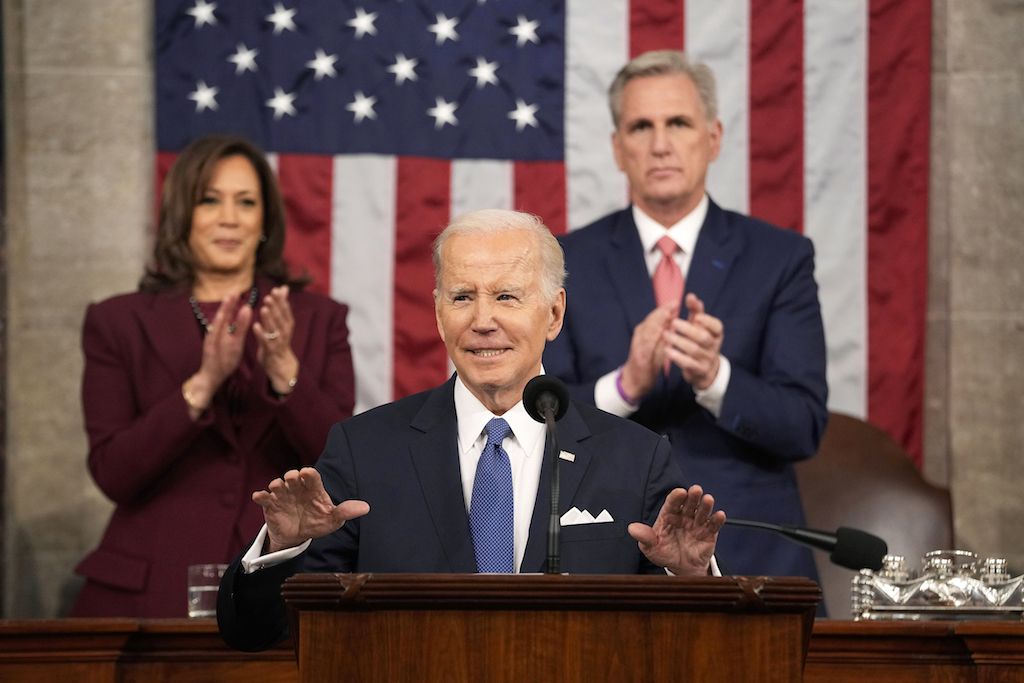President Biden gave his second State of the Union address on Tuesday, marking the halfway point of his first presidential term. The speech was characterized by enthusiasm for the economy, populist rhetoric, and bipartisanship. But Biden’s sunny characterization of his administration’s achievements and plans painted a picture of the United States that doesn’t reflect the reality of hundreds of millions of working and poor people. It didn’t reflect the deep structural crisis his administration is trying desperately to stabilize — a crisis whose symptoms include a shaky economy, increased geopolitical tensions, and a radical Far Right that is throwing its weight around in a polarized country where many feel increasingly unrepresented. Biden tried to paint a picture of a United States that has come back stronger after the pandemic, but despite his populist rhetoric and laundry list of policies, none of these measures can address the real needs of the vast majority of the working class and poor who have been exploited and oppressed for much longer than the last two years.
Biden’s speech was a victory lap, touting legislation passed under his administration and especially legislation that hasn’t passed yet (and isn’t likely to). Biden seemed to be setting the foundations for his 2024 presidential campaign. In a direct appeal to working people feeling the effects of inflation and layoffs, Biden began his speech by touting recent jobs numbers, saying his administration has created over 12,000 jobs since he took office two years ago, more jobs “in two years than any president has ever created in four years.” He emphasized falling food prices and rising take-home wages to assuage fears about inflation. He celebrated the economy, saying unemployment is the lowest it has been in over 50 years. Biden also talked about his administration’s ability to reach across the aisle, touting the passage of the Inflation Reduction Act, the CHIPS and Science Act, and other bipartisan laws. Referencing January 6, he said that U.S. democracy is stronger than ever.
But while Biden painted a rosy picture of first two years in office, it was just a snapshot of a much more complex process of crisis and imperialist decline facing the United States. In short, Biden’s speech was largely a list of distractions and distortions.
The president’s approval ratings have dropped in recent months, hovering at 42 percent — one of the lowest ratings for a president entering his third year in office — after recovering slightly from a sizable dip over the summer. A poll released a day before the SOTU speech showed that just 37 percent of Democrats support a second term for Biden. And while inflation may have cooled over the last six months according to certain metrics, it is still high, the Fed is still raising interest rates, and nearly all economists agree that an even more rocky economy lies ahead. To control inflation, the government must make sure that workers’ wages don’t go up — meaning that in the past year, the wages of the entire working class have been devalued at a rate not seen in 40 years. A whopping 59 percent of Americans disapprove of Biden’s economic direction.
Biden put forward an “America-first” populist rhetoric aimed at courting both the Left and the Right — touting big plans for government spending on infrastructure and social programs on the one hand, while on the other hand playing up an economic nationalism that appeals to sectors of the Right who see “buying American” as a path to economic stability. Contrary to a reality of extreme polarization that was borne out in the midterms last year, Biden — with Republican House Speaker Kevin McCarthy nodding behind him — aimed to present a picture of united bipartisanship, capitalists reaching across the aisle to present a common solution to the crises facing the United States today. With uncharacteristic vigor, he — literally — yelled over the sounds of the U.S. regime in crisis; nowhere was this more evident than when he was heckled by the far-right members of the GOP “Freedom Caucus,” who shouted “liar!” throughout the speech, to which Biden replied, “We all apparently agree!”
More than anything, this cracked picture of stability was a show Biden put on for working-class voters who are fed up with years of economic exploitation and systemic oppression. Biden’s speech had no shortage of direct appeals to these sectors. Saying that all workers have a right to unionize, he demanded the passage of the PRO Act. While repeatedly affirming that he is a capitalist, he spoke out against the pharmaceutical companies and the big capitalists who pay abysmally low taxes. He portrayed himself as a proud capitalist politician horrified by the inequalities, “extortion, [and] exploitation” of the system he upholds.
Though Biden made many promises at the podium (including curing cancer), the truth is that the most ambitious parts of his legislation have not and will not pass. Democrats didn’t fight for these proposals when they controlled both the House and the Senate — giving concession after concession and refusing to challenge the undemocratic filibuster — and they definitely won’t be able to pass them now that the Republicans control the House. And if these promises do come to fruition, they will be used to increase the profits of sectors of capital, just like Biden’s infrastructure bill. Take Biden’s promises for action on the climate crisis. His policies have actually meant increased handouts for the fossil fuel industry; the role of Biden and the Democrats is to acknowledge the problem and refuse to provide any solutions that could hurt capitalist profits. This is the crucial function of the bipartisan regime. Biden’s first two years have presented plenty of evidence of this.
What Biden did last night was give himself ammunition against the Republicans for the 2024 election to blame them for standing in the way of legislation that would help working and poor people. And looking through all the shiny populist rhetoric and talk of rebuilding America, we can clearly see that Biden’s proposals can hardly confront the urgent issues facing working and oppressed people living in the United States. Policies that are spread out over 10 years — if they even pass — do little to change the circumstances of the hundreds of millions of people in the United States threatened by poverty, systemic racism, and queerphobia; lack of access to abortion access and other healthcare; and climate change.
Biden largely steered clear of foreign policy, and what he did present on the topic was full of obvious distortions. Albeit with plenty of nationalist flare, Biden tried his best to present a case for international harmony, saying, “I’ve made clear with President Xi that we seek competition, not conflict.” Seeking to turn attention to how he is addressing domestic issues, Biden made little mention of the regime’s laser focus on deterring the growth of China through both economic and military means. Indeed, if he wanted to make a show of bipartisan unity, nowhere is this more clear than in both parties’ agreement to use billions of taxpayer dollars to fund hawkish attempts to revitalize U.S. imperialist domination.
He similarly downplayed the United States’ critical interest and role in Russia’s war against Ukraine, saying the United States is aiming for “more peace, not just in Europe, but everywhere.” In his picture of American resurgence, he did not mention the massive U.S. military budgets and spending packages that Congress passed posthaste to bolster NATO’s influence in Eastern Europe and try to maneuver better terrain for the U.S.’s struggle for geopolitical power, even as imperialist warmongering plunges much of the world into poverty and crisis.
Biden instead focused on domestic issues, presenting a picture of his administration’s ability to use the bipartisan regime to pass policy while at making overtures to a Republican Party that is leading the most disgusting attacks on workers and the most oppressed sectors of society. At the start of the speech, Biden shook hands with Speaker McCarthy. He praised Mitch McConnell alongside Chuck Schumer and Nancy Pelosi.
Even as they heckled him, Biden offered an olive branch to the far-right members of the GOP, whom he previously called extremists and proponents of white supremacy. Biden largely avoided talking about Donald Trump, instead asking Republicans to be partners in his proposals and break the polarization that continues to haunt the regime.
Biden’s grand gestures to the Republicans show that contrary to the belief of liberals, trade union bureaucrats, progressive social service and social justice nonprofits, and the reformist Left, Biden cannot be relied on to fight the Far Right. Abortion is outlawed or likely to be outlawed in 24 states, trans people are being denied access to lifesaving resources and healthcare, and the teaching of Black history and the history of systemic racism is being banned in schools — and these attacks reached new heights under Biden’s administration. Biden performatively denounced these attacks, tacking them on to advertising for toothless policy proposals that will not pass. He cynically used the grief of Tyre Nichols’s parents to demand more funding for police and some cosmetic reforms to a fundamentally racist and anti-worker system, and he once again relegated the struggle against the Right to voting in the next election.
For its part, the Republican Party made no effort to hide its true colors. In her response address, Arkansas Republican governor Sarah Huckabee Sanders offered no gestures of goodwill to the Democrats, doubling down on a nationalist, anti-trans, “anti-woke,” and anti-immigrant rhetoric. Her disgusting tirade highlights that the Republican strategy is a “culture war” that scapegoats trans people and the teaching of history in order to drum up support for a party that wants to slash social security and social services. Huckabee Sanders admitted that there is a “culture war,” but Biden’s SOTU speech made it clear that neither he nor the Democratic Party has any interest in fighting it. And his rosy picture of the “state of the union” shows that he has no proposal for how to improve the living conditions of the hundreds of millions of working people in the United States who are facing the effects of inflation and crumbling infrastructure, as well as the attacks of the Far Right.
Biden’s posturing rings hollow for the millions of exploited and oppressed people who see more uncertainty than stability ahead, and who know they will be the ones the capitalists make suffer for it. If the Republicans are the only ones who speak to the desperation of millions of people fed up with crumbs and empty promises, then the field for the attacks of the Far Right will only open wider, leading working people to another dead end.
It is urgent to build an organization that explicitly condemns the attacks of the Far Right and makes a plan to fight back — in our workplaces, schools, and communities — against the attacks on immigrants, trans people, voting rights, abortion access, on the right to protest and organize, healthcare, and the teaching of the history of racism. And in taking up this struggle, such an organization will fight for more, going beyond the empty promises of the Democrats and their illusions in the stability of the capitalist system. We need a party that raises the real demands of the working class and oppressed, beginning with an end to austerity and privatization, an end to union busting, mass layoffs, and the unequal two-tier wage system; one that fights for free healthcare that includes full reproductive rights, for the need to defund and abolish the police, and for a society that is controlled by the class that actually makes things run, not the capitalists and the rich who impoverish the majority and destroy the planet.












